12 of the healthiest foods in Indian cuisine
Dieticians from the Physicians Committee for Responsible Medicine, a United States nonprofit with more than 17,000 doctor members, released a report on the 12 healthiest foods that can help Indians improve blood sugar, reduce cancer risk, reduce inflammation, and improve overall health. These foods are already present in Indian cuisine, and focusing on a diet that includes these ingredients, is low in fat, free of dairy, and free of animal products can help reduce symptoms of chronic disease.
This report is part of the ongoing nutrition series, Fight Diabetes With Food—a free online nutrition course taught by Indian health experts and doctors from the Physicians Committee for Responsible Medicine.
Twelve of the healthiest and nutrition-packed Indian foods are:
1. Lentils: Yellow, Green, Red, Black, and White
One cup of cooked lentils gives consumers 90% of their daily recommended amount of folate and 37% of their daily recommended amount of iron. Lentils are low on the glycemic index, high in fiber (one cup of lentils provides 15 grams of fiber), and low in fat, all of which help improve blood sugar control. According to a meta-analysis in the American Journal of Clinical Nutrition, lentils and other legumes are satiating and low in calories, so they easily aid in weight loss.
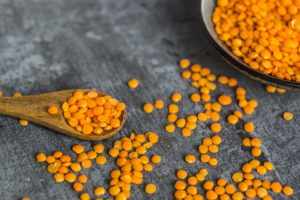
2. Millet
Millet is a whole grain that boosts heart health and helps improve glycemic control. This is because millet is high in fiber and a rich source of magnesium. The phytochemicals and fiber found in whole grains like millet may also reduce colon cancer risk.
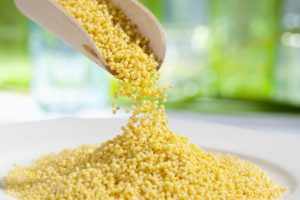 3. Tomatoes
3. Tomatoes
Tomatoes are high in phytonutrients, compounds produced by plants that benefit human health and help prevent various diseases. Because of the various phytonutrients, tomatoes are anti-inflammatory. One phytonutrient in tomatoes is lycopene, which helps reduce prostate cancer risk. Lycopene is more bioavailable in cooked tomatoes. Tomatoes are also an excellent source of vitamin C.
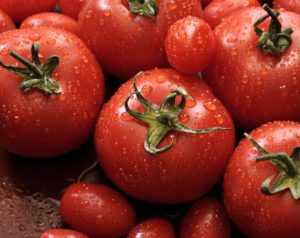
4. Ginger
Ginger is best known for relieving nausea, motion sickness, and gastrointestinal distress. The anti-inflammatory compounds in ginger, known as gingerols, may also be helpful in relieving pain and swelling in osteoarthritis patients according to research.
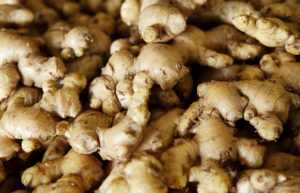
5. Turmeric
Curcumin is a natural anti-inflammatory compound found in turmeric. Curcumin can be as powerful as some anti-inflammatory drugs, but without the side effects. Its antioxidant properties can be beneficial in the treatment of certain conditions, including psoriasis, according to a study conducted among a group of 63 Italians with mild-to-moderate levels of the skin condition.
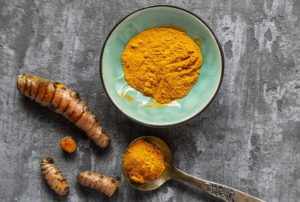
6. Cinnamon
Cinnamon may improve glycemic control and reduce the risk of type 2 diabetes, according to several studies.
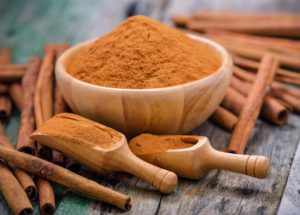
7. Sweet Potato
Sweet potatoes have a lower glycemic index than white potatoes, meaning they break down to glucose much more slowly. Plus, a sweet potato’s orange color is a sign of its high beta-carotene content, an antioxidant that can help improve the body’s immunity.
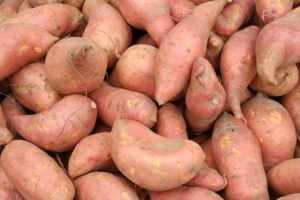
8. Spinach
Spinach contains high amounts of dietary iron and magnesium, with one cup of cooked spinach delivering 6.5 grams of iron. One cup of cooked spinach is also high in other nutrients, like magnesium (157 mg), potassium (839 mg), folate (263 g), and vitamin C (17.6 mg). This is a great green to cover a lot of nutrient needs!

9. Garlic
Researchers analyzed the results of nine different trials, which included 768 people with diabetes, and found that supplementing with garlic helped lower blood sugar and improve cholesterol levels.

10. Fenugreek
A recent meta-analysis found that fenugreek lowered fasting blood sugar by an average of 12.9 mg/dL, while lowering “bad” (low-density lipoprotein) cholesterol by 11.1 mg/dL. 
11. Mango
Sweet, juicy mangos are rich in potassium, which promotes healthy blood pressure. They’re also high in vitamin C and beta-carotene, antioxidants that fight damaging free radicals and help keep your cells healthy.

12. Cardamom
Botanically, cardamom is a cousin to ginger, and both help lower inflammation. While cardamom has long been used in cooking, science is just starting to uncover its health benefits. One small study found that supplementing with cardamom lowered markers for inflammation. And an analysis of five other studies found that while cardamom didn’t lower cholesterol, it did seem to help lower triglyceride levels, another type of fat found in the blood.
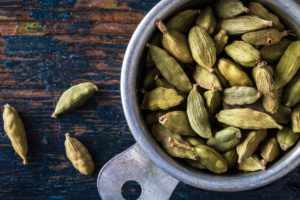
Studies have shown that plant-based diets are effective at managing and even reversing type 2 diabetes and that those following a plant-based diet have approximately half the risk of developing diabetes, compared with non-vegetarians. Studies have also found that a plant-based dietary intervention improves insulin resistance and beta-cell function.
Fight Diabetes With Food India is a free eight-week class series, which teaches participants about the power of a plant-based diet to improve diabetes dramatically, sometimes even reducing or eliminating the need for medications. In each class, physicians, community partners, and nutrition experts provide practical tips, meal planning, and interactive Q&A.
India Program Specialist Zeeshan Ali, PhD, health coach and restaurant owner Nidhi Nahata, Actress Mallika Sherawat, and Physicians Committee President Neal Barnard, MD, will join the program. Dr. Barnard is a New York Times bestselling author, Fellow of the American College of Cardiology, and leading clinical researcher in the field of nutrition for diabetes.
